From November 18th to November 19th, the Dept. Politics of ECNU and the research center of public affairs and government governance jointly held the "country in the field" seminar and the "governance and country" workshop. More than 20 experts and scholars from Compilation and Translation Bureau of the CPC Central Committee, Tsinghua University, Fudan University, Zhongshan University, Shandong University, Wuhan University, Zhejiang University, Shanghai University of Finance and Economics, Shanghai International Studies University, East China University of Political Science and Law, Party School of Shanghai Committee of C.P.C., Party School of Zhejiang Committee of C.P.C. participated in the seminar.
 Group photo of participants
Group photo of participants
The opening ceremony was presided over by Wang Xiangmin, Professor of the Dept. Politics of ECNU and the research center of public affairs and government governance of ECNU. Then, Professor Liu Qing who is the head of Dept. Politics and Professor Xiao Yanzhong who is the director of academic committee of Dept. Politics made a brief speech and they warmly welcomed the experts and scholars present at the meeting. The keynote speech was delivered successively by Professor Jing Yuejin of Tsinghua University and Professor Liu Jianjun of Fudan University.
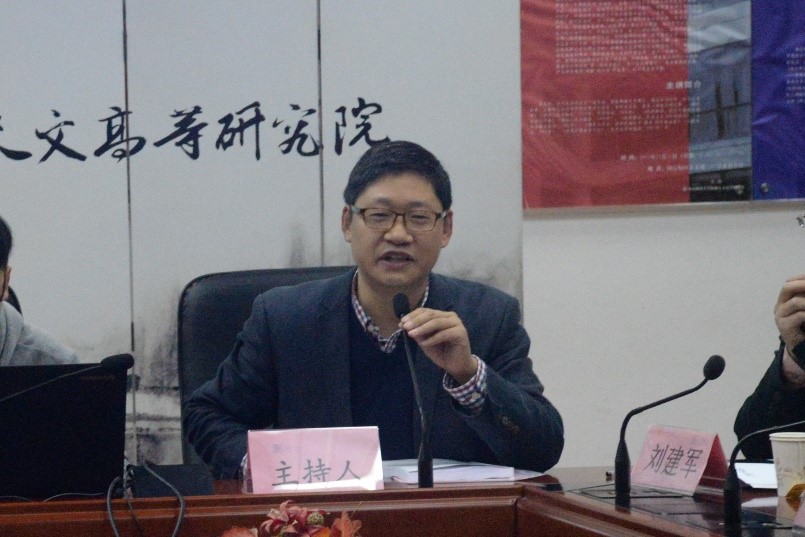
Professor Wang Xiangmin presided over the seminar
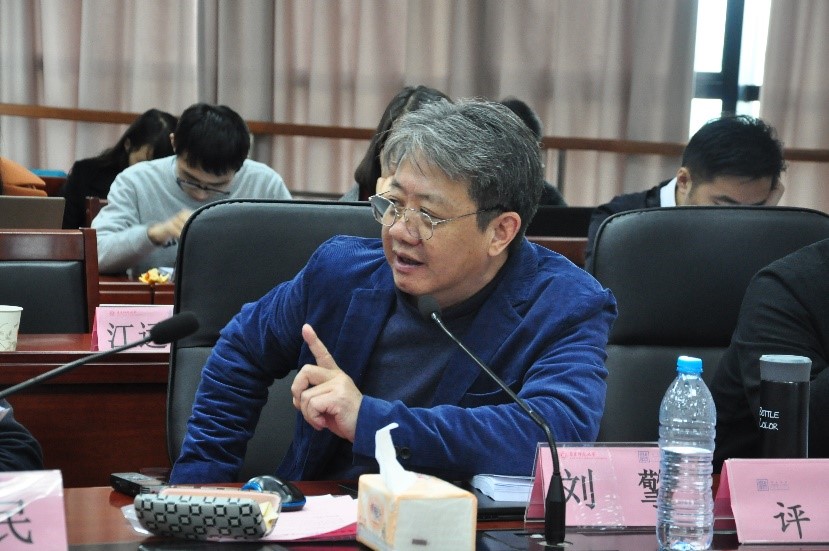
Professor Liu Qin made a brief speech
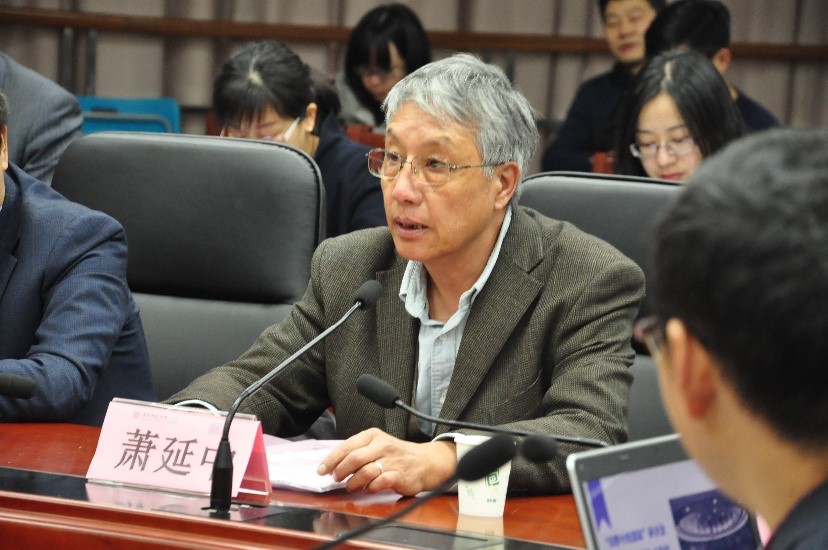
Professor Xiao Yanzhong made a brief speech
The topic of Professor Jing YueJin is ‘Logical transformation of China’s rural grassroots governance –Rethink of the relationship between the state and the society’, The topic of China’s rural governance logic was discussed from the macroscopic view, On the basis of the developmental trend of rural society, Professor Jin Yuejin made two basic judgments, three inferences and two questions that need further thinking. First, it is the background trend of the development of China’s rural social. He said that the pattern of urban and rural areas has changed that never happened before, It means the transformation that drawing resources into transporting resources, the industry nurturing the agriculture and cities supporting the countryside. The public finance has began to cover the countryside. Second, resources to the countryside (or to say project scheme) and power to the countryside are two sides of the same coin. The process that the state uses it power to bring resources to the rural areas and both the nation and the party jointly solve the problem of poverty alleviation, beautiful countryside, balance urban and rural development makes the fundamental changes in rural social governance structure. And then is three inferences. One is that the pattern of "township government and village governance" formed in the 1980s is undergoing subtle changes. The historical process of state power construction is not over. The gap between the legal status of villages and their actual roles is widening. Second, the process of state power infiltration is no longer at the cost of eradicating the traditional cultural power network. The dual structure of the constructive village and the natural village provides space for the benign interaction of "peaceful coexistence". Third, under the background of the party and government system, the infiltration of state power can be carried out simultaneously through two channels: the government channel and the party channel. Finally, two questions are raised: how to view the administrative trend of the constructive village? What is the picture of China's rural governance structure? 
Professor Jing Yuejin delivered the keynote speech
Professor Liu Jianjun delivered a keynote speech with the topic of "community in China”. From the perspective of the philosophy of social governance tool, the end of the remaining political space, community in the country, the autonomy, the co-governance and the rule of law, and so on, Professor Liu understands the "community in China” and constructs the concept of political science in life. First of all, as the research object, the concept of urban community should adopt the idea of a multi-level governance unit, and use the philosophy tool of one divides into three for social governance. Then the related concepts of property rights and neighboring rights can be put forward. Secondly, he analyzed the end of the remaining political space in the community, and put forward the concepts of organizational capital, the leader of compound community and spiritual community. Then, about the community in China, he further put forward many other concepts including middle breakthrough, interactive and governance, participant project scheme, administrative division and inclusive governance, governance and management units, and business alliances and business checks and balances.
In the end, Professor Liu put forward the idea of "learning on feet", hoping to make full use of the field method to construct a good governance society.
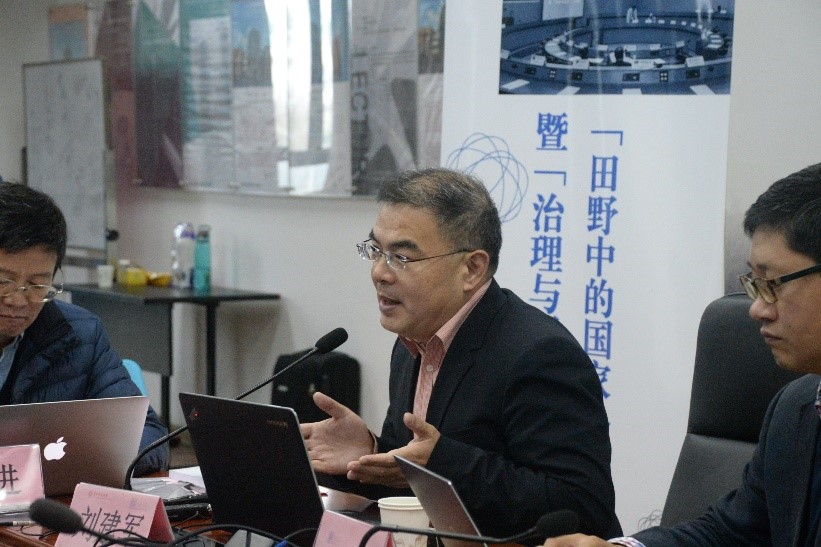
Professor Liu Jianjun delivered the keynote speech
This meeting is divided into five sessions for specialized discussion. The theme of the first session was "From Chinese experience to political theory". Professor Chen Jiagang of Compilation and Translation Bureau of the CPC Central Committee addressed the topic of "China's experience in the study of political science". He put forward four aspects. First, how will Chinese cultural soft power, Chinese style, Chinese voice and the Chinese wisdom be embodied in the academic research? He believed that the study of Chinese experience should not be separated from the perspective of history, comparison and practice, but should focus on the study and abstraction of China's history, tradition and events. Second, where do the facts of China's experience come from? In fact, it requires us to move from the macro level to the micro level and from studying the state and political parties to studying the concrete practices, micro-phenomena and social problems in China's experience. Third, how to put the variate that is CCP into the study of China’s experience? When we do research about experience in China, many of our analysis framework and the analysis mode did not notice the role of the party and the government, As the result, the conclusion may lead to the exist of deviation, So it is necessary to attach importance to the the variate that is CCP. Fourth, there is a strong correlation between the researchers' own knowledge and practice and the quality of empirical researches. China's experience research should be carried out in the fields of China. Professor He Junzhi of Zhongshan University believes that Professor Chen's views provide a program, action guide and unique personal experience for the study of Chinese politics. But he also points out that what exactly does China's model and experience mean?
Whether we can summarize the clear concept of China's basic political reform, which implies the basic academic research judgment.

Professor Chen Jiagang made the speech
Professor He Junzhi from Zhongshan University made a speech named with "from’ transfer station’ to ‘container’: the superposition and institutionalization patterns in the function of the National People's Congress (NPC) ", He discussed the change of the National People's Congress system. First of all, from the perspective of the background, the NPC system is an important part of the socialist system with Chinese characteristics and a fundamental political system that supports China's national governance system and governance capability. Secondly, how to measure its institutionalization academically? Why institutionalized? Aiming at these problems, he made further analysis and pointed out that the institutionalization of the NPC system has its particularity. Nowadays, the autonomous mode and embedded mode were unable to explain China's National People's Congress (NPC) standing committee's institutionalization. Finally, it is concluded that the institutionalization of the NPC standing committee is a process of functional superposition.

Professor He Junzhi made the speech
Professor Luo feng from Party School of Shanghai Committee of C.P.C. spoke on the topic of "The country in the community: intervention and limitation". From the perspective of voluntary organizations in the community, he analyzed how can the party and the state intervene in the community, so as to understand the changes of grassroots governance and political mobilization in Shanghai. First, it is the re-organization of Shanghai in level 1994 and level 1995 governments, 3 levels of management and 4 levels of network. The second is to innovate social governance and strengthen grassroots construction, which is the so-called number one project. He thinks the community is of great importance in political mobilization.
He pointed out that there are three types of voluntary organizations of the community and state intervention in the Chinese context: endogenous voluntary organizations, implanted voluntary organizations and mobilized voluntary organizations. In this regard, the state may embed the party's activities into mass organizations through the party organizations. By the way of legality recognition, the service centers of social organizations are set up on the community street for overall registration. Intervention can use administrative resources, such as the supply of funds, venues and opportunities for activities. It is also useful by institutional incorporation, such as the establishment of special projects. Finally, he pointed out that the convergence of interests between the state and society and the tension between the state and social goals determine the coexistence of national and social forces. The focus of the future will be to energize the society, not to replace it all with government mandates.

Professor Luo feng made the speech
At the end of the first part, Professor Wang Xiangmin from our department brought the speech "how to apply ideal type analysis to field experience research?" Starting from the theme of the seminar, he believed that the Chinese experience could be written or understood in a more standardized way, so that researchers could reach consensus on the normative level of modern social science methods. He made a example that it can apply the ideal type research to the field experience research, and make the empirical research form an explanation which is not internal, specific and unified. Although due to the experience of Chinese and western is different, and we are different in understanding and evaluation. But through the platform of concept can make everyone discuss in a basic judgment or level, so as to construct a normative knowledge expression system. Then he made some attempts in three ways using Max weber's ideal type method. The first is the ideal type’s method and its applicability. The ideal type is made up of a lot of concrete cases studies and is used a lot in the study of the history of thought. In fact, the ideal type has two dimensions. One is empirical research, and the other is critical dimension, through which we can find the empirical phenomenon of China. Followed by are the two strategies of the analysis of the ideal type, In accordance with the modern social sciences, they are interpretation and explanation. Explanation is likely to natural science, interpretation is likely to elucidation, and the aim of empirical research is to explain, which emphasizes the objectivity and values their independence. Finally, the academic name of ideal type analysis is for conceptualization.
Empirical studies need to emphasize concepts in China. The analysis of concept of ideal type and the analysis of the concept of comparative politics are not the same in starting point, but we can draw lessons from the concept of comparative politics to deepen or transform the problem of analysis of the ideal type.

Professor Wang Xiangmin made the speech
The second part discussion takes "historical experience and institutional logic" as the theme.
Professor Zheng Weiwei from our department first elaborated on the paper “the power transformation and the organization adjustment: a brief analysis of production increasing and conservation committee in Shanghai's "five countervailing" movement. From the perspective of time development and political science, he explored how a mobilization committee operated in the political movement and the internal composition, He took the production increasing and conservation committee in Shanghai as case. He believes that the operation of the committee can be divided into three stages. In the first stage, the function of the committee was to launch “three countervailing" movement. In the second stage, Shanghai committee of the communist party of China changed the internal organization of this committee and established the party leadership group (decision-making organ). And the structure of the power had been changed. The third stage is mainly the adjustment period when Gu Zhun and Cao Man left the stage. Finally, he concluded that from the point of operation process of the committee, political mobilization is the basic way of national construction and social integration, and organizational mobilization is the foundation of political mobilization. But from the perspective of the construction of modern country, political mobilization is only suitable for abnormal politics, The rule of law has gradually become the basic mode of national construction.

Professor Zheng Weiwei made the speech
Hao shinan, a professor from Shanghai International Studies University, made a speech entitled "the evolution of China's military-political relations and the theoretical challenges they bring". He embarked from the domestic and foreign research, There are at least three patterns in military and political relations as "the party commands gun", "symbiosis", "power politics" model, But these model are not able to explain the change of civil-military relations in China after reform and opening up. Therefore, it is necessary to discuss the essence and forming mechanism of the new form of China's civilian-military relations from the 1980s to the present with the guiding principle of "paying attention to change and exploring the root".
After the reform and opening up, technical experts (politicians) have deepened the transformation of the military and political relations on the basis of Deng Xiaoping's heritage.in the reform of the army. And further military modernization strategy leads to the transformation of the people's liberation army as the "capital - knowledge" army, thus the new type of military and political relations has been built up Professor Zheng Weiwei pointed out that the combination of history and theory in studying history is very suitable for us, and pointed out that any country has military problem that is how to determine the military input according to the strategic judgment.
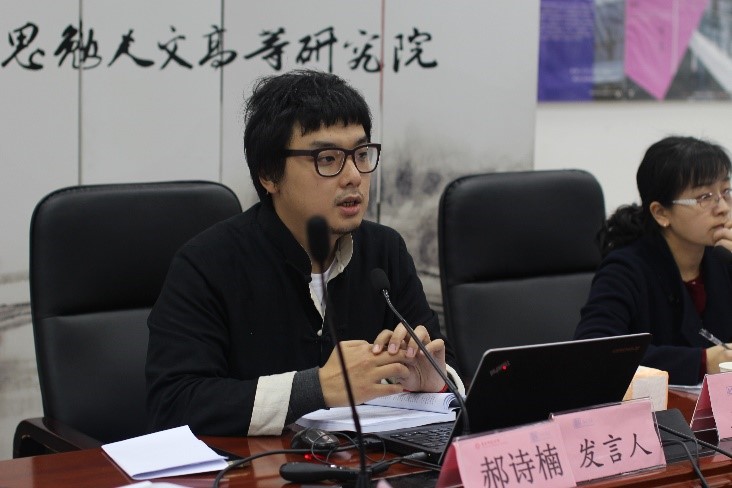
Professor Hao shinan made the speech
The thesis of Professor Wang zhongyuan from Fudan University is "the Conditions for Authoritarian Consolidation by Elections in Single - Party Regimes: largest employer China and Taiwan Compared". He analyzed the role under the non-democracy election, and used the comparative analysis on Mainland China and Taiwan as object to reveal the condition that the election needs. His view is that the early literature believed that elections could consolidate power, but it was conditional. First, whether the local power structure can control the election, Second, what is the opportunity structure of the election and how is the strategy of the opposition. Third, whether there is a commitment on the legitimacy of democratic institutions to competitive elections. He argued that it is not the absence of elections that affects the effectiveness of non-democratic countries, but how elections themselves are conducted. In the end, on his own field experience, he thought that the field is a research method and is far more than data collection, but is a process of data collection and analysis of interaction, We’d better use our own feet to learning. As a kind of method, more try in methodology should do for further exploration of the field. The role and interpretation of the electoral system also caused a heated discussion on the spot.
 Professor Wang zhongyuan made the speech
Professor Wang zhongyuan made the speech
The third part focused on "the technology of governance in practice". Professor Wang Guoqin from Party School of Zhejiang Committee of C.P.C. made a speech named by “the party state and society in the institutional change: analysis to a case ". He discussed whether the Chinese political system can adapt to or deal with a lot of contradictions and conflicts during the transitional period. He thinks that the ideology of decision-making elites, traditional ideology and innovation, as well as the support of local government have great influence on the system change. China's political system as a whole is dynamic, and the active role of the party, the state and the society, as the core institutional structures, cannot be replaced in the goals of economic development, social stability and political reform. Finally, the research about the party, the relationship between the state and society, and the relationship itself in the process of China's current political structure importance do not match. How to improve the party's way of leadership and governance is an important issue which needs further study.
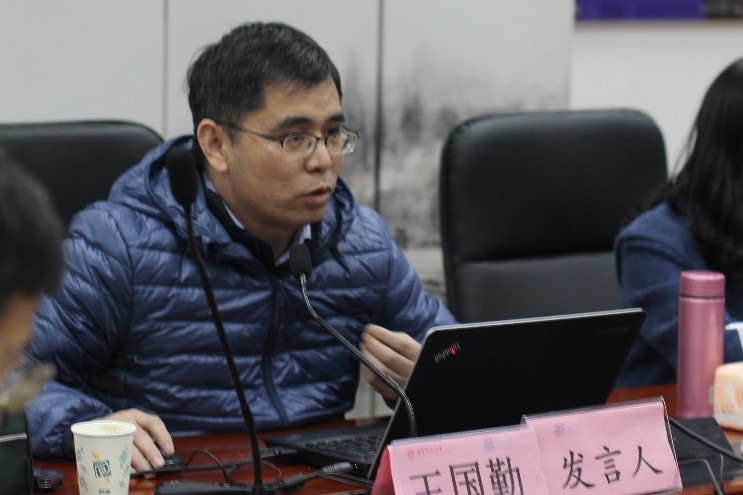
Professor Wang Guoqin made the speech
Professor Xin Ge from Shanghai University of Finance and Economics delivered a speech entitled "the path of China's participatory reform: taking the evolution of regional financial budgets as an example".He took regional financial budgeting process as a case. He thought that the public participation in policy making is very important, and made comparative analysis of China's local governments three participate in the path, namely the representative path, the path of counselors and transparency. These three participation path are dominated by government, but there are significant differences, including the degree of institutionalization, the degree of party and government organizations to interact with the masses, composition and characteristics of the participants and the power of the process of policy making, etc. By comparing and analyzing the three forms of participation with the corresponding examples, three models are obtained, which clearly show the policy making model of limited participation. Finally, he concluded, although for the development of the three kinds of participatory reform is unknown, what is certain is the party must appeal to the request of the public, so these roads can become potential directions to be chosen in the mass participatory and systematic reform. Professor Wang Guoqin commented that the article was very interesting and ambitious. However, there are defects in the research methods and the selection of control variables.

Professor Xin Ge made the speech
From the perspective of the interaction between the state and the society, Professor Li Zhen of Shandong University asked the question: is it possible that the reporting system with a large number of new technologies could be an alternative to sports governance? He set out from two problems. First, by showing the national level macro picture of technical report system, supplemented by the comparative analysis of price report cases of the two periods, it can be observed that how the new technology with the model alters the behavior of government regulation, as well as the channels and ways of the state and the society. Secondly, it traces the evolution of price supervision system and reporting system of A country, and looks at the historical environment of the two types of supervision modes, namely sport management mode and reporting system. Then based on heavy of the task of price supervison and the present of internal operated logic price of regulators, it can be answered why passive response to complaints and continuously follow the old sports management becomes the choice of current regulators. Finally, it is concluded that the national regulatory model after the application of new technology has changed from active and regular law enforcement to relying more on daily price reporting. The extensive application of new technology and the formation of the complaint reporting system have not completely replaced the sport management.

Professor Li Zhen made the speech
At the end of the third session, Professor Li Hanqing of East China University of Political science and Law published a paper entitled "technology absorbs politics: functions and limits of WeChat in government affairs in the era of" we media "-- taking" Shanghai release "as an example. He pointed out that "Shanghai release", as a WeChat for government affairs, provides technical support for the refinement of local government social governance, satisfies the public demand, and at the same time arouses the enthusiasm of public participation. But on the other hand, the "Shanghai" has its limitation, including the lack of function for citizen demands and the poor of technical service and inter-departmental collaborative. So now relying too much on technical functions is bound to cause governance dilemma. He believed that to make it possible for technology absorbing politics. The political process must be optimized through technological improvement and public participation. At the same time, the power of the state needs to be transformed to basic power. The concept and mechanism of government should be changed to service-oriented government, and the leaders should have strategic vision and an open attitude to Internet public opinions.
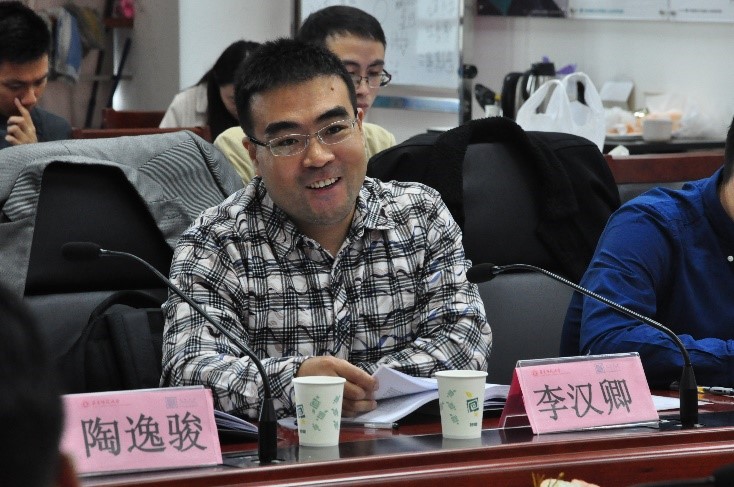
Professor Li Hanqing made the speech
The fourth theme is "social governance". Shandong University Professor Wang Junyang made a speech with "From" after the blow" to "preventive control" - the evolution of the macro strategy of integrated governance under the perspective of the central authorities "title. He studied the stage after 1980s. From 1980s to 1990s, he thought, the strategy has changed from cracking down on crime to the comprehensive stability, the reason of which is that the central timely reacts on the type of social problems faced. He pointed out that this approach realizes the use of flexible practices and plays an important role in preventing large-scale social events and maintaining social stability. According to Jiang Yuanshan's own experience, the change of the strategy of integrated governance is obvious, and the study of the strategy of integrated governance is of great practical significance today. He pointed out from two angles. In the 1980s, after the reform and opening to the outside a series of changes brought about by the population flows, which is a big background the change of the strategy. And he pointed any question that whether we can make the integrated governance be researched in the process of modernization; Second, the change of the state system in the 1980s was another major reason for the change of integrated governance policies.

Professor Wang Junyang made the speech
Jiang yuanshan, a teacher from our department, made a speech in "how social conflicts in China go public? -- from the perspective of Social Constructivist Theory ". He thought that since the new century, China's growing social conflicts have been public. This way of the characteristic mainly displays in the way of the conflict, governance processes, the social nature of the conflict, the solution of the conflict. He pointed out that the social conflicts in public is the results of protesters’ construction in a particular social situation, especially the change of the social formation caused by China's society transformation, such as hierarchical economic stratification, polarization between the rich and the poor and social class consolidation, which eventually form " disseminated social conflict". In addition, he also mentioned that the conflicts between officials and people are becoming increasingly acute, and that the society has not formed a good conflict evacuation system, which has led to the public conflict and formed a vicious circle gradually. Therefore, from the perspective of Social Constructivist Theory, he hoped to construct a reasonable social class structure through the reform of the political system and public decision-making model.
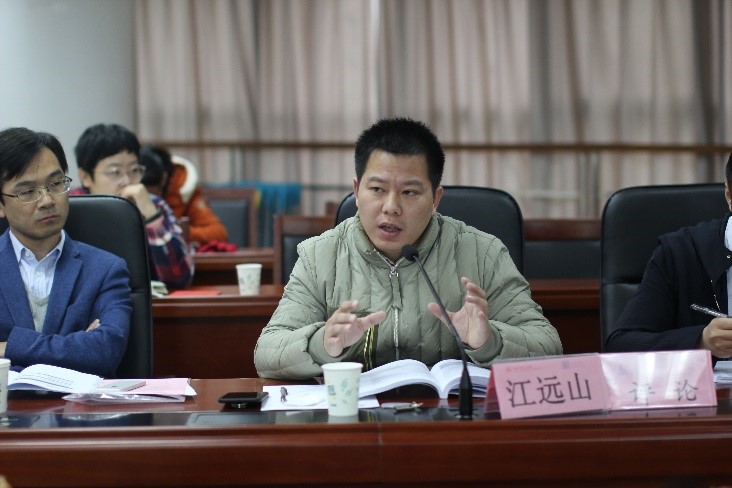
Teacher Jiang yuanshan made the speech
In the end of the 4th stage, the teacher Tao Yijun from my department entitled "the pattern of all-round social governance situation ─ ─ take the T district of the northeast area as the example”. From the perspective of social governance, he discusses how to realize the transformation of social governance around the case of northeast T district. What is the system for its planning and transformation? What type should it be attributed? In what social situation does it work? What are the limitations? He thinks the all-round social governance of the original planned economic system combines the background of the general adherence of the society. However, since China's reform and opening up, with the change of social background, T district goes for those routes, forming the social governance system such as the government-leading, comprehensive planning, restructuring society, sending staff and organizations’ downward infiltration. And the organization form relies on the regulation of the department. And gradually infiltrates down from the position of the department, playing a role, and presenting the social governance system of "regulatory infiltration". In face of the change of social governance pattern, it is urgent to reform the system and reconstruct the social governance system.
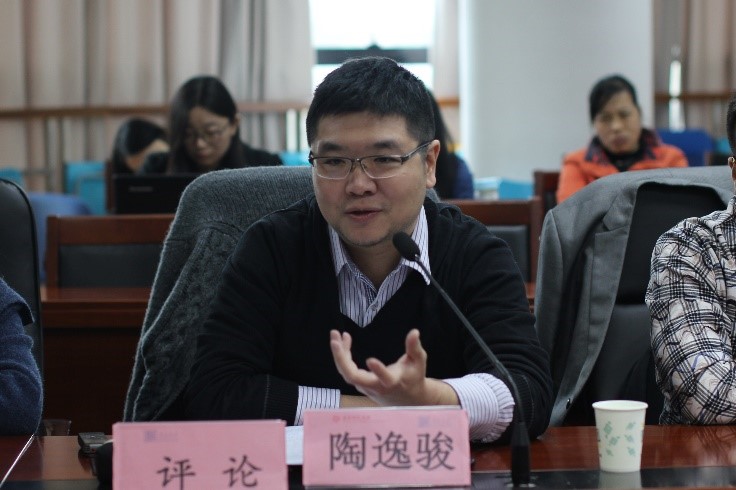
Teacher Tao Yijun made the speech
The fifth theme is "organizational performance and governance system". Liu Wei, a professor from Wuhan university, made a speech entitled “policy performance and political identity in the discourse of ordinary people -- an interview with old farmers in Sanping village, Baokang county. He pointed out that political performance is an important factor affecting farmers' political identity and also constitutes the premise and foundation of political legitimacy. He pointed out that the great changes in the rural areas after the founding of the People's Republic of China had led to a great psychological change in the performance of the state's policies towards farmers, which originated from their direct experience of the state policies in their life. Through the specific case analysis, professor Liu pointed out that the political psychology of the old farmers is extremely complex when facing the performance of national policies, and it is difficult to define and judge the cognition of positive and negative performance. In view of this, there is no simple positive correlation between policy performance and farmers' political identity.
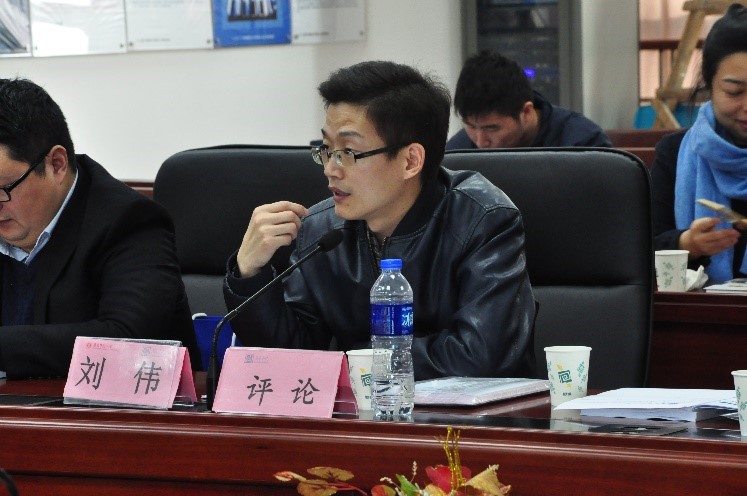
Professor Liu Wei made the speech
Yuan Chao, a teacher at Party School of Shanghai Committee of C.P.C., made an speech entitled "relationship binding, the failure of bureaucracy and the adverse selection of officialdom". He thought that the current Chinese officialdom is the adverse selection phenomenon, making the talent officials of both ability and political integrity be sidelined, and the so-called "honest and upright official" rely more on rules for the protection and promotion, and resulting in the "inferior officers in and good officers out" which is the malignant officialdom ecology. Followed by argument, he thought, the failure of bureaucracy provides this kind of phenomenon the organization foundation and system logic. "Relationship" is therefore constantly embedded in the government in the process of choosing and employing persons from positive and negative aspects. Finally, he mentioned how to find a balance between the system and the relationship, instead of regulating the relationship through the system. Teacher Wang Shikai considered that the operation of modern state mainly relies on the system to maintain, rather than the individual moral and quality. Performance is not necessarily the result of the people (relationship), but more likely to be a holistic regulation of the system.

Teacher Yuan Chao made the speech
Wang shikai, a teacher from East China University of Political Science and Law, spoke on the theme of "political society: the political foundation of modern countries". Domestic scholars do localization research first, he thought, is China's own problems. China is in history but also in the world. The basic experience of China's modern national construction is the basic framework of modern countries to reconstruct the political unification. The core of modern state is direct rule, which must build a supporting foundation in the society, which is the political society.n He tries to construct the concept of political society between the state and society as the foundation of modern state in society. He further pointed out that the political society is a network, and the concept of nationalism, citizenship, class divisions, political union and political exclusion relationship, political parties and social organizations, the allocation of the representative and selection rules are the basic elements of the network. At the same time, political society is not cookie-cutter, but is free to transform between different types of domination, compromise, closure and openness. Therefore, as a middle theory, political society bridges the split between state and society caused by the Social science theoryand provides a third theory explanation except the state and the society.

Teacher Wang shikai made the speech
Scholars debated with each other but they were all around a basic consensus that from the experience of the field to construct China's national theory system and by comparative perspective and China’s field experience to construct the concept of expression the localization and internationalization
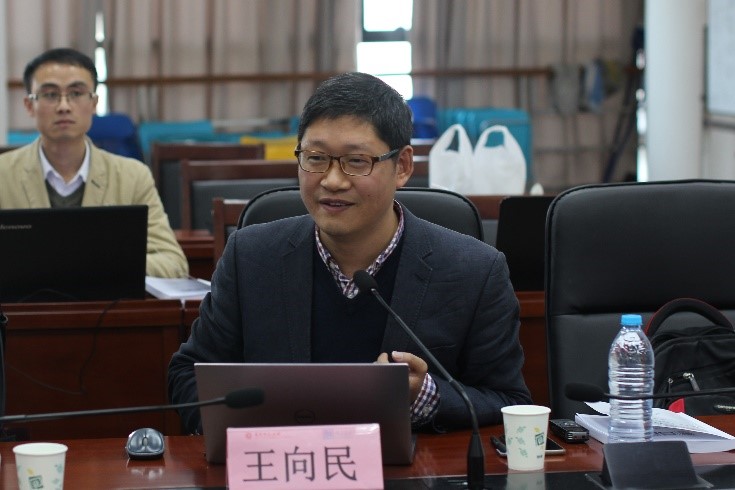
Summary of Professor Wang Xiangmin
Following these discussions, Professor Wang Xiangmin finally reviewed and summarized the theme of the conference, trying to build an academic community, establishing people’s own knowledge expression and norms, and establishing pure academic discussions. He also raised two expectations. The first is the discussion of normative papers. In the future, we need to establish a sense of discussion and give more constructive evaluation to the papers. It is most important to start from the paper and try to understand the real intention of the paper. The second is to focus on the real issues. The construction of the academic community needs to put aside normative skills to discuss the reality of China, focused on China's future direction, pay attention to those who truly valuable in China in the problem, this is the purpose of the construction of the academic community. During the one and a half day meeting, more than 20 scholars made full use of the relatively sufficient time to publish and comment, carrying out intense and rich discussion and in-depth exchanges. At noon on November 19th, this year's seminar ended and the participants keep there until close.